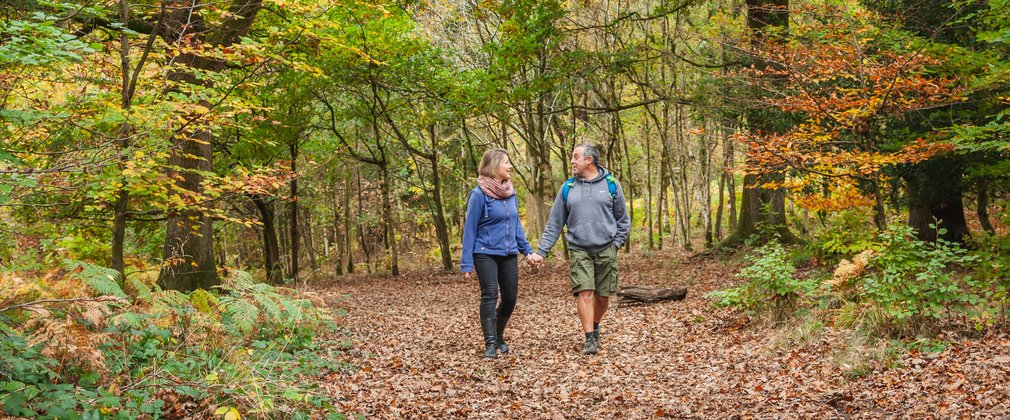
Spending time in forests is crucial for both people and planet
We’re mid-way through October and it’s becoming increasingly tempting to put the kettle on and retreat under the covers. But new research has suggested that the amount of time we spend indoors is affecting our health – which in turn is impacting the planet.
A new survey commissioned by the Forestry Commission has found that more than two thirds of people (68%) in the UK think they spend too much time inside between October and March. Almost four in five people (79%) who agreed they didn’t go outside enough said, they regretted it.[i]
Studies have shown how exercising in forests provides a distraction from fatigue[ii], making physical activity feel easier and more enjoyable[iii], keeping people active for longer[iv], and increasing their satisfaction compared to working out indoors[v]. In addition, being among trees helps to reduce stress, improves mood[vi], and reduces the possibility of poor mental health.
Research has also revealed that outdoor pursuits in natural settings can help people feel more connected to the natural world.[vii] Not only does this benefit individual wellbeing, it has been shown to encourage pro-environmental behaviour.[viii] Spending time outdoors is a win-win for people and planet.
Ellen Devine, Wellbeing Project Manager at the Forestry Commission, says,
“There is an intrinsic link between our own health and wellbeing, and that of the world around us. The more time we spend in forests, going for a walk, enjoying ourselves, the more likely we feel part of the world around us, and inspired to do what we can to protect it.”
A 2019 report found that 88% of people in the UK agreed that a lot more trees should be planted across the country, but only 3% of people were involved in voluntary work, tree planting or community based woodland groups.[ix]
Dr Liz O’Brien is Head of the Social and Economic Research Group at Forest Research and has been researching how trees and forests can contribute to people’s health and wellbeing for fifteen years. She says,
“Our research has shown how the diversity of wildlife found in forests, the scenery and sense of freedom heightens sensory stimulation and encourages people to take notice of their surroundings and feel better connected to nature. This can improve how they feel about themselves, towards other people and the wider world.”
Devine adds,
“A lot of people can feel despondent about climate change, how wildlife is faring and other environmental issues. Spending more time outdoors, connecting with and appreciating the natural world can be a starting point for change. It can re-ignite people’s motivations to stand up and be counted, get active in their community and find ways to make a positive difference.”
While the Forestry Commission study found the vast majority of people agree that forests improve their mental (81%) and physical health (82%), only 13% of people visited a forest or woodland each week. Almost two thirds of people (64%) said they wished they could visit forests more.[x]
Forestry England hosts a huge range of events and activities across its sites to encourage people to spend time in forests, and is inviting people to share their experiences online using #MyForestMoment as part of their wellbeing campaign.
In Sherwood Pines bushcraft workshops help people struggling with mental health issues, while wild women days at Grizedale welcome groups to spend time immersed in nature, foraging, building fires and cooking meals together.
At Bedgebury Pinetum in Kent, an organisation called Primal Roots delivers outdoor gym experiences in the forest to improve health, wellbeing and people’s connection with nature.
Primal Roots co-founder, Carl Adams, says:
“While we recognise the value of gyms, we know those real moments of connection, to the earth and to each other as a community, come when we’re fully immersed, perhaps even lost, in the full flow of a communal, forest fitness experience.
“You can find us running the trails of Bedgebury Pinetum, stretching out with primal Pilates, using breathing techniques that help us feel healthy, happy and as strong as the trees around us – a feeling that stays with us all day, no matter where we go after.”
The Forestry Commission has been marking its centenary in 2019 with a programme of activity to inspire people to connect with forests and woodlands. This includes a dramatic sculpture trail that recently opened in Thetford Forest, reflecting the vital role forests play in protecting our environment. Two writers in residence have been creating new work to celebrate the diversity of England’s forest landscapes, while people were asked to share forest poems and stories in a project called Tributes to Trees.
The Commission also organised a 10km running series and hosted the Big Forest Find, the largest ever survey of England’s forest wildlife. For more information visit forestryengland.uk/100
[i] YouGov Omnibus Research – Forestry Commission September 2019
[ii] Physical activity in natural environments, Carly Wood, Miles Richardson and Jo Barton
[iii] Physical activity in natural environments, Carly Wood, Miles Richardson and Jo Barton
[iv] Human Health and Sustainable Forest Management, Forest Europe
[v] Physical activity in natural environments, Carly Wood, Miles Richardson and Jo Barton
[vi] [iv] Nature Therapy and Preventive Medicine:
[vii] Physical activity in natural environments, Carly Wood, Miles Richardson and Jo Barton
[viii] Beyond knowing nature: Contact, emotion, compassion, meaning, and beauty are pathways to nature connection, Ryan Lumber, Miles Richardson, David Sheffield
[ix] Public opinion of forestry 2019 – Forestry Commission
[x] YouGov Omnibus Research – Forestry Commission September 2019
Notes to Editor
The Forestry Commission is the government department responsible for protecting, expanding and promoting the sustainable management of England’s woodlands. Forestry England and Forest Research are agencies of the Forestry Commission.
Forestry England manages and cares for the nation’s 1,500 woods and forests, welcoming 230 million visits per year. As England’s largest land manager, we shape landscapes and enhance forests for people to enjoy, wildlife to flourish and businesses to grow. Forestry England is an agency of the Forestry Commission. www.forestryengland.uk
Forest Research delivers internationally-renowned tree-related research for Great Britain and beyond. www.forestresearch.gov.uk
For more information or images contact:
Harry Shepherd | Communications Officer | Forestry Commission centenary
e: harry.shepherd@forestryengland.uk
t: 07920 542173
England’s forests:
drive.google.com/drive/folders/13c-VyNac0AD2jbqLoKOXKaS-Xl9EcbUl?usp=sharing
People in the forest:
drive.google.com/drive/folders/1k-MW0XWERWNHOAlgfb1faPzVj3lQEkhw?usp=sharing
